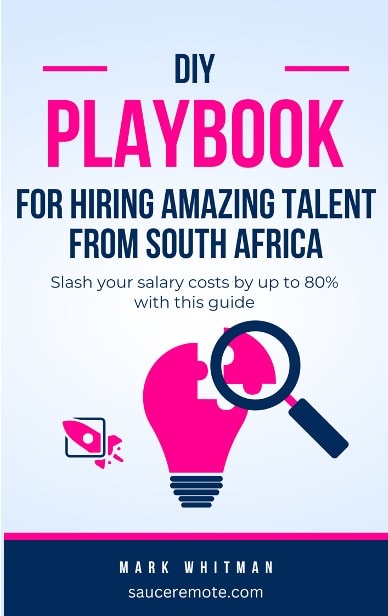Thinking about hiring Dutch employees? Great choice!
The Netherlands is known for its innovative business environment and talented, multilingual workforce. But hiring there can come with its own set of legal and cultural challenges.
Enter the Employer of Record (EOR) in the Netherlands.
I’ll explain how working with an EOR can simplify your recruitment while keeping everything compliant.
Ready? Let’s roll.

Discover how to slash your salary costs by 80%
Get our exact process for hiring amazing overseas talent from South Africa. Includes copy-and-paste templates and a detailed salary guide.
What Is an Employer of Record in the Netherlands?
An Employer of Record in the Netherlands is a third-party service provider that officially hires workers on your behalf and handles all local employment, HR, and payroll responsibilities.
Essentially, the EOR is the legal employer, ensuring compliance while you manage your team daily.
My pro tip: Not sure what an EOR actually does? Check out my guide on What Does EOR Stand For to get all the basics.
Why do companies choose to work with an EOR in the Netherlands rather than hire directly?
Here are the main reasons:
- Quicker Market Entry: Skip the long and costly process of setting up a local entity.
- Regulatory Compliance: The Netherlands has complex employment regulations, and an EOR knows them inside out.
- Cost Efficiency: Avoid the administrative burden and costs that come with establishing a local company.
Using an EOR allows you to tap into the Dutch talent pool quickly and fully comply with local laws.
But what makes the Dutch labour market so appealing, and how does an EOR make it easier for you?
Let’s find out.
Hire remote talent from South Africa & slash salary costs by 80%
Salaries start from £8,000 per year!
Understanding the Employment Landscape in the Netherlands
When I first explored hiring in the Netherlands, I was struck by the country’s focus on employee well-being and progressive labour regulations.
These laws provide strong protection for workers but can be challenging for international companies to navigate without help.
Here’s what you need to know:
Standard Working Hours and Flexibility
The Netherlands values a good work-life balance. A standard full-time workweek is typically around 36 to 40 hours, often spread across four or five days.
- Maximum Weekly Hours: Dutch law limits working hours to 48 hours per week on average, calculated over a 16-week period.
- Flexible Work Arrangements: Dutch employees are entitled to request flexible working hours or remote work, and employers are generally expected to accommodate these requests if possible.
Compensation and Currency
The currency in the Netherlands is the Euro (EUR).
The Dutch labour market offers:
- Minimum Wage: The statutory minimum wage is adjusted twice yearly, in January and July. As of 2024, the monthly minimum wage for employees aged 21 and over is €2,016.
- Bonuses and Benefits: Performance bonuses are common, and additional perks like pension contributions, travel allowances, and health insurance are often included in compensation packages.
Let’s move on to holidays and leave entitlements.
Hire remote talent from South Africa & slash salary costs by 80%
Salaries start from £8,000 per year!
Public Holidays and Annual Leave
The Netherlands has several public holidays, including:
- New Year's Day
- King's Day (April 27th)
- Liberation Day (May 5th, celebrated every five years)
- Christmas Day and Boxing Day
As for annual leave, employees are entitled to a minimum of four times the number of days they work per week.
So, if they work five days a week, they’re entitled to at least 20 vacation days per year—though many employers offer more.
Now, let's discuss taxes and social security.
Tax Obligations and Social Security Contributions
Navigating taxes in the Netherlands can be a bit overwhelming, especially for foreign businesses. Here’s a quick overview:
- Payroll Taxes: Employers must handle wage tax withholdings and social security contributions.
- Income Tax Rates: The Dutch tax system is progressive, with rates ranging from 36.93% to 49.5%, depending on the employee's income level.
- Social Security: Employers also contribute to social security, which covers things like unemployment benefits, sickness, and disability.
Hire remote talent from South Africa & slash salary costs by 80%
Salaries start from £8,000 per year!
Leave Policies and Parental Benefits
Here are some of the key entitlements for employees in the Netherlands:
- Sick Leave: Employers are generally required to pay at least 70% of an employee’s salary for up to two years if they’re unable to work due to illness.
- Parental Leave: Employees are entitled to unpaid parental leave, which allows them to take up to 26 times the number of hours they work per week. Additionally, there is a partially paid parental leave scheme for eligible parents.
Understanding these policies is crucial for staying compliant. This is where an EOR can truly be invaluable—they manage all these obligations so you don’t have to.
Probation Period and Termination Rules
Here’s a quick look at probation and notice periods in the Netherlands:
- Probation Period: Typically, probation periods in the Netherlands last from one to two months, depending on the length of the employment contract.
- Notice Period: The standard notice period depends on the length of employment, ranging from one month for shorter tenures to up to four months for longer-serving employees.
The rules surrounding termination can be complex, as Dutch law tends to favour employee protection. An EOR can help ensure that all procedures are followed correctly, reducing your risk of disputes.
But how do you choose the best EOR in the Netherlands?
Let me help.
Hire remote talent from South Africa & slash salary costs by 80%
Salaries start from £8,000 per year!
How to Choose the Best EOR in the Netherlands
Choosing the right Employer of Record (EOR) is crucial for successful recruitment. When looking at a potential Dutch EOR, consider the following:
Knowledge of Dutch Employment Law
Your EOR should be well-versed in Dutch employment contracts, compliance requirements, and cultural nuances.
This ensures that you remain compliant with local laws, reducing the risk of legal issues and fostering a positive work environment for your team.
Comprehensive Services
Look for an EOR that offers payroll administration, HR support, and compliance assistance under one roof.
Having all these services integrated means fewer headaches and smoother processes, saving you time and allowing you to focus on growing your business.
Transparent Pricing
Your EOR should have a clear and transparent pricing structure with a detailed breakdown of fees.
Knowing exactly what you're paying for helps you budget effectively and avoid unexpected costs, giving you greater financial control.
Flexibility
Choose an EOR that can adapt to your specific industry requirements and growth plans.
As your business evolves, a flexible EOR can adjust its services to meet your changing needs, supporting both your short-term and long-term goals.
Proven Track Record
Look for client testimonials, case studies, and evidence of the EOR's experience in the Netherlands.
A proven track record provides peace of mind, knowing that the EOR has successfully helped other companies expand into the Dutch market.
Local Presence
An EOR with a local team in the Netherlands can offer better support and deeper cultural insights.
A local presence ensures quick resolution of issues and helps integrate your new employees into the local work culture, leading to higher employee satisfaction and productivity.
But what if all of this sounds too daunting? Well, I’ve got a solution for that.
Hire remote talent from South Africa & slash salary costs by 80%
Salaries start from £8,000 per year!
Consider Alternative Labour Markets
While the Netherlands is an excellent choice for business expansion, exploring other labour markets that align with your recruitment goals may also be worthwhile.
For example, South Africa offers a highly skilled workforce, often at more competitive costs.
South Africa is known for its strong tech talent and has been attracting global companies due to its favourable business environment and growing pool of skilled professionals.
Exploring alternative labour markets could offer different advantages, such as lower operational costs or access to specific talent pools.
And here’s the best part.
An Employer of Record in South Africa can help you evaluate which market might best fit your recruitment strategy.
Final Thoughts
And there you have it: Expanding into the Netherlands can be incredibly rewarding, but it comes with its own set of challenges.
Partnering with a reputable Employer of Record simplifies this journey by managing compliance and administrative tasks, allowing you to focus on growing your business.
Ready to make your move into the Netherlands? Let an EOR handle the heavy lifting so you can focus on what you do best—building your team and expanding your vision.
